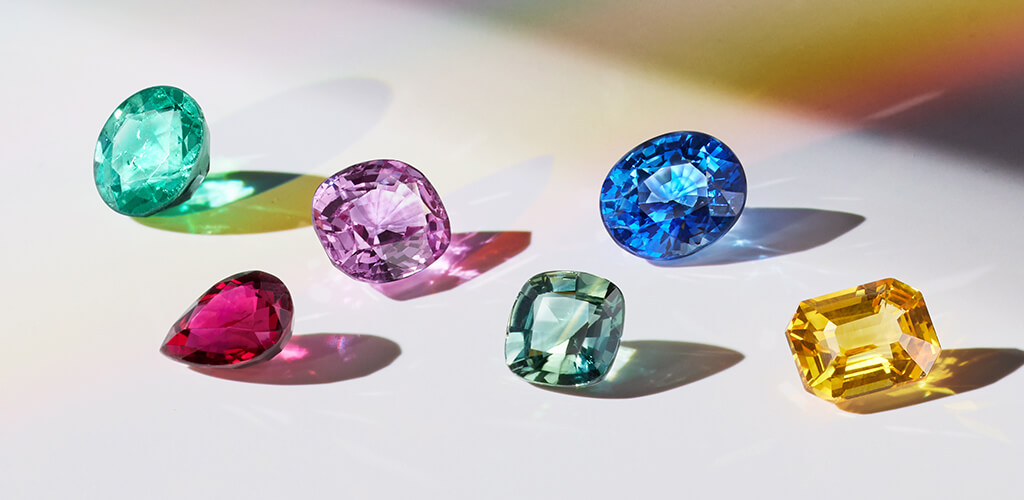
Gemstones are beautiful, fashionable, and a great way to express your style. But how do you know which ones to buy…and where? Read on to find out everything you need to know to ensure you pick out the perfect colored gemstone for you.
We understand there is a lot to consider when making such a significant purchase. After reading this blog, you may not be a certified gemstone expert, but you might start to feel like one!
Let’s start with the basics. Many of us know about birthstones, different gemstones that correspond to the months of the year. But what are these colorful creatures, and how are they created? Are all gemstones created equal? Let’s dive in.
Numerous gemstones exist, the most popular being garnet, amethyst, aquamarine, diamonds, emeralds, pearls, rubies, peridot, sapphires, opals, citrine, and topaz. Each gemstone corresponds to a month of the year, is associated with a special meaning, and has its own color (or colors…some gemstones come in more than one hue).
Related Blog Post: Birthstone Engagement Ring Ideas For Each Month
You may have heard about earth created and lab grown diamonds, well their fellow gemstones (yes, diamonds are a gemstone!) are no different. Gemstones can both be found in the earth and created in the lab. Lab created gemstones, like natural gemstones, are 100% real. The only difference is their place of origin and process of creation. The final result is still a real, vibrant, colorful gemstone.
Gemstones fall into two major categories: precious and semi-precious. Only four gemstones are considered precious: diamonds, sapphires, rubies, and emeralds. All other gemstones are part of the semi-precious category. The main difference is hardness. While precious gemstones are incredibly sought after, they are necessarily more valuable than their semi-precious counterparts. The value depends on things like rarity, size, and quality.
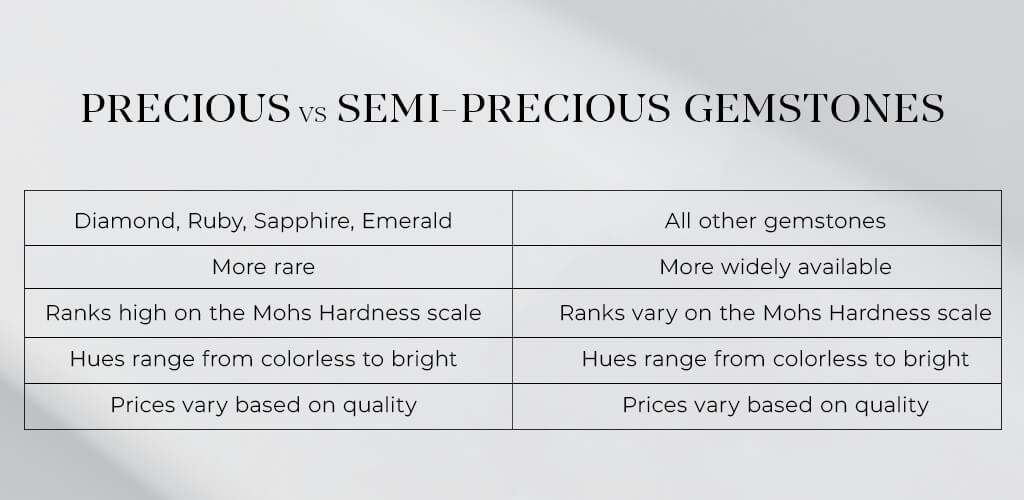
There is a lot to know when buying gemstones. We recommend keeping the following things in mind:
The color of a gemstone has three main factors: hue, tone, and saturation. The hue of a gemstone is what most people picture when you talk about color. Frequently, the color of a gemstone is mixed, consisting of a main color and a second color mixed in. Saturation refers to how pure or intense the main color is.
The purer a gemstone’s hue or color, meaning the smaller the tints of other mixed in colors, the more valuable the gemstone. Additionally, the brighter and more dynamic the color, the better. Many shoppers prefer gemstones whose color is more mild than dark.
When it comes to gemstones, clarity concerns the amount of inclusions or blemishes in the gemstone. This is an important consideration as it affects the value and appearance of the gemstone. Gemstone clarity is rated from “included” to “flawless.” The more flawless, the higher the value.

A gemstone’s cut is how it is shaped and polished. This affects the value of the gemstone, as well as its brightness. Gemstone cuts come in round, princess, Asscher, cushion, emerald, oval, marquise, and pear.
Related Post: How To Choose The Best Diamond Shape And Size For Your Finger
A gemstone’s carat refers to its weight, another important factor when determining the value of a gemstone. Larger gemstones are considered more rare and thus more valuable.
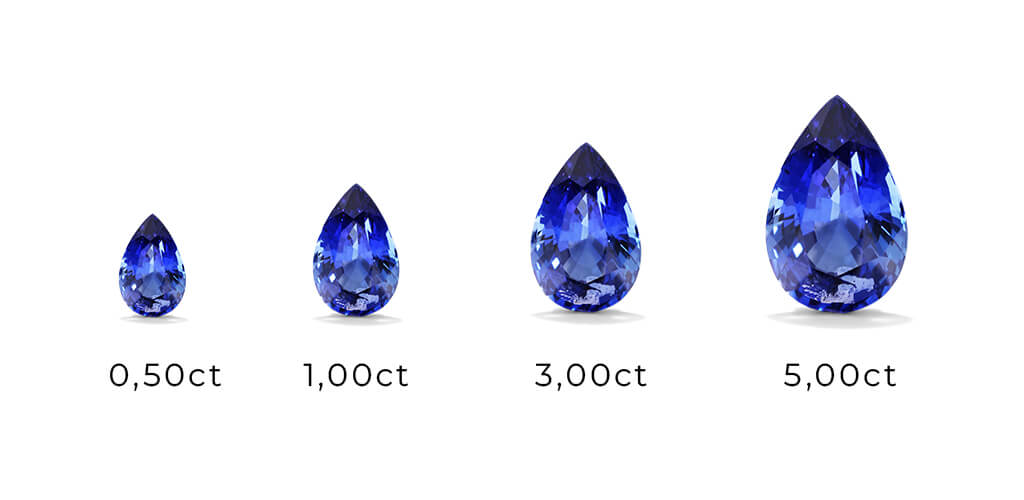
Gemstone grading reports state details and specifications about the gemstone, such as the carat weight, shape, and other measurements. It also notes if the gemstone has received treatment. You must purchase a gemstone with a grading report from a reputable agency, such as the GIA, IGI (International Gemological Institute), or AGS.
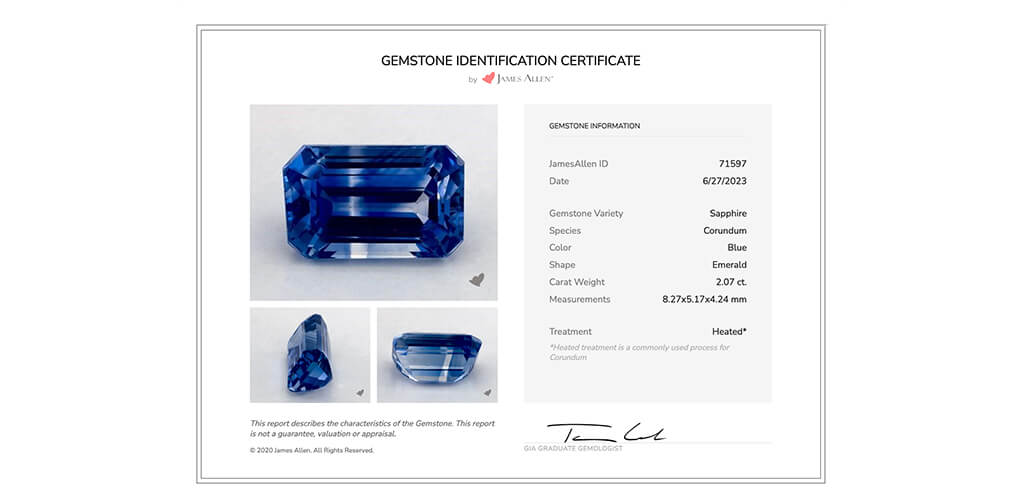
Gemstone treatments, also known as enhancements, are the processes applied to gemstones to improve their natural state. These treatments generally make the gemstone stronger and improve its brightness. Some treatments have a permanent effect, while others require maintenance.
The most common treatments are heat treatments, irradiation, dyeing, filling, and coating. Heat and irradiation treatments and coating treatments help to bring out the color and improve the gemstone’s clarity. Filling treatments help to repair any cavities or fractures that can affect a gemstone’s appearance.
While a professional gemologist using microscopes can tell if a gemstone has been treated, generally, gemstone treatments are unseen by the naked eye.
As you can see, buying a gemstone is a serious business. When making such an investment, it is important to keep the following things in mind:
Once you have chosen your gemstones, it is important to maintain them so they always shine bright.
You have two choices when cleaning your gemstones: at home or with a professional. When choosing to do so at home, follow these steps:
If unsure, you can always bring your gemstone to a professional for cleaning services. This can be done at most reputable retailers.
When storing your gemstone, keeping them in the original soft packaging is recommended to prevent scratches and other possible damage.
Keep your gemstones out of direct heat or sunlight, and always avoid harsh chemicals. It is also recommended to safely store your gemstones when going to the beach, swimming in a pool (hello chlorine!), working out, cleaning, and showering.
Remember, these things can damage the gemstones you spent so much time selecting. Let’s keep those gemstones shining bright!
Related Post: How To Protect Your Engagement Ring At The Gym: And Other Times To Remove Your Ring
If your gemstone is part of an intricately designed piece or you are nervous about undertaking this task yourself, it is best to ask a professional. Most reputable jewelry retailers will provide cleaning services.
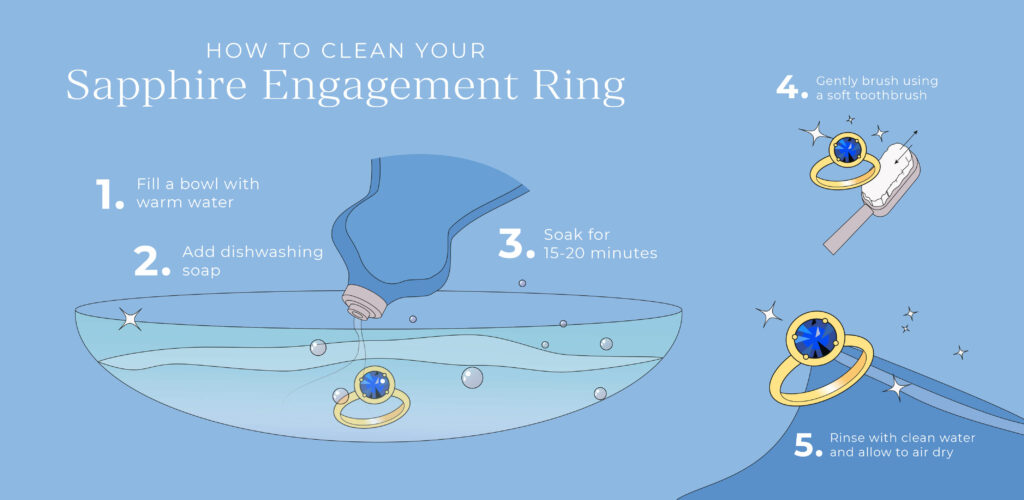
This may be our most important tip! You have done the research and found the gemstones; now, it’s time to show them off! Whether you choose a unique, colorful gemstone engagement ring, a fabulous birthstone pendant, or gorgeous gemstone earrings, make sure to enjoy them!
Keep in mind the type of gemstone you want, of course, your budget, and the 4Cs. Don’t forget to consider any treatments and look for certification.
The only difference is where they come from. Gemstones from the lab are just as real as those found in the earth. They just have a different origin story.
The most common treatments are heat, irradiation, and filling. While these treatments improve the gemstone’s appearance, they can (but do not always) lower its value, making these beautiful pieces more affordable.
Do your research! Read customer reviews and make sure their products are certified. Check their return policies and always look for jewelry associated with and/or uses certificates from professional organizations such as the AGS or GIA.
Make sure to safely store your gemstone and keep it clean. And, of course, enjoy it!